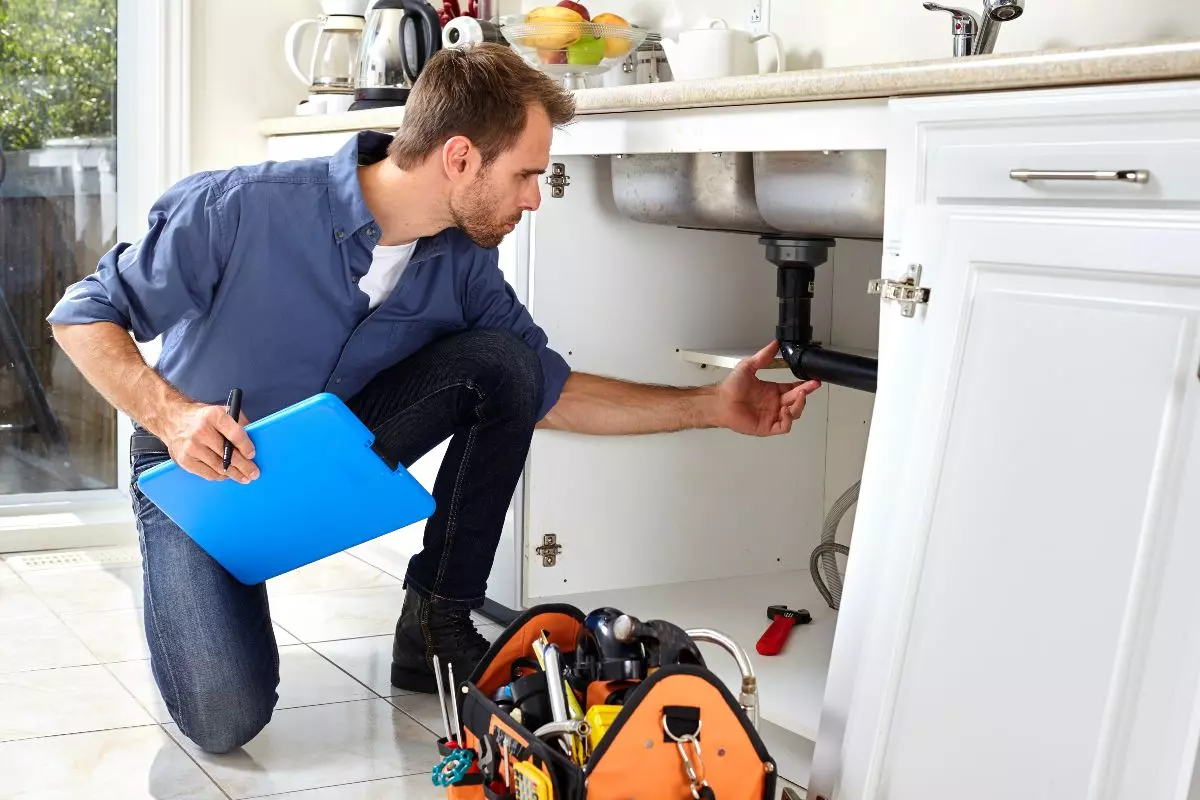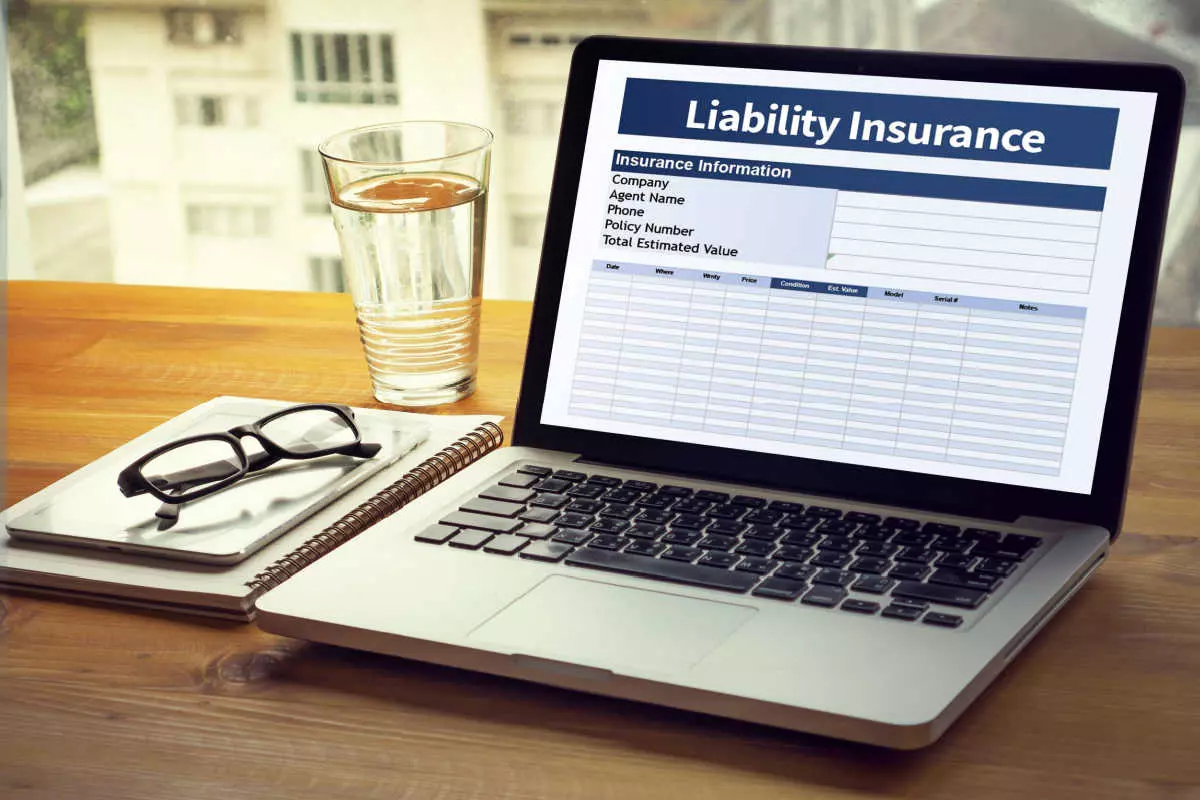Table of Contents
- Is Starting a Plumbing Business a Good Idea?
- Starting a Plumbing Company: Step-by-Step Guide
- Research the Plumbing Industry
- Obtain Licenses and Certifications
- Decide Your Services and Pricing
- Secure Financing
- Choose The Perfect Plumbing Company Name
- Register Your Plumbing Business
- Obtain Bonding and Insurance
- Purchase Necessary Plumbing Tools and Equipment
- Hire Plumbing Technicians
- Create a Professional Website
- Develop a Marketing Strategy
- Leverage Modern Solutions
- Sum-Up
Whether you’re an experienced plumber ready to take the plunge into business ownership or new to the trade but eager to learn, starting a plumbing business is an exciting venture with significant financial rewards. In fact, did you know that, on average, 35% of a plumbing company’s revenue is profit?

This guide will walk you through each step of creating your plumbing business from the ground up. We’ll start by helping you conduct market research. Then, we’ll guide you through the practical steps of setting up your business, such as getting the proper licenses, properly insuring your business, investing in equipment, and building a skilled team.
We’ll walk you through each step of creating your plumbing business from the ground up, helping you lay the pipes for a successful plumbing business together.
Is Starting a Plumbing Business a Good Idea?
The short answer is yes. The American plumbing industry has a market value of $126 billion, with over 110,000 businesses employing around 500,000 people. These numbers are a testament to its enduring demand and economic resilience, offering a stable venture for budding entrepreneurs.
With the industry expected to grow at a compound annual growth rate (CAGR) of 4.2%, entering the plumbing business allows you to combine a satisfying and growth-oriented career.
Starting a Plumbing Company: Step-by-Step Guide
Starting your own plumbing company is an exciting leap towards building a prosperous future for yourself. Consider this roadmap as a plumbing startup checklist to transform your vision into reality:
Research the Plumbing Industry
As with any business venture, it’s good to be prepared with industry research, equipping you with the insights needed to carve out your niche and outmaneuver competitors. Here’s how to gain a comprehensive understanding of the plumbing industry:
- Demand and Profitability: To get a clear picture of the demand and profitability within the plumbing industry, look at detailed reports from IBISWorld and Statista. Supplement this data with insights from industry-specific sources such as the Environmental Protection Agency (EPA) for regulations that might impact demand and the American Water Works Association (AWWA) for trends in water management and conservation that could drive new service opportunities.
- Location: Evaluating your operational area is more than just understanding its demographics. Consider the population density, the average age of residential and commercial properties, and the economic climate. Utilize local government resources for zoning and development plans and real estate databases like CoStar for insights into new commercial and residential developments.
- Study Competitors: Conduct a detailed analysis of both local and national plumbing businesses. Research their range of services, pricing strategies, marketing efforts, and customer feedback by reviewing memberships and certifications from industry bodies like the Water Environment Federation (WEF), which may highlight competitors’ areas of expertise or service gaps you can fill.
- Residential vs. Commercial Clients: Decide whether you will focus on residential, commercial, or both types of clients. Determining your client focus requires an understanding of the different needs and scopes of residential versus commercial projects. Engage with trade associations specific to plumbing, such as the National Association of Plumbing-Heating-Cooling Contractors (NAPHCC), for insights and networking opportunities that can clarify client demands.
- Customer Preferences: Directly engaging with your target market provides valuable feedback on service preferences and expectations. Use social media platforms to conduct polls or surveys and monitor discussions on home improvement forums. Review sites like Yelp and Google Reviews can offer unfiltered feedback on customer priorities and dissatisfaction points with existing services.
Obtain Licenses and Certifications
For plumbing companies to operate legally and gain credibility in the industry, obtaining the necessary licenses and certifications is a step that cannot be overlooked. The specific plumbing business requirements can vary significantly from one jurisdiction to another, but there are commonalities most plumbing businesses will need to address.

A plumbing business license is required to operate your company legally. Your city or county typically issues this, and the application often requires your business name, address, ownership details, a personal ID, and sometimes a Federal Employer Identification Number (EIN).
Plumbing licenses are another key requirement, and these are more specific to the trade. Typically, many states require plumbing license holders to have all of the following:
- 3-4 years of apprenticeship under a certified master plumber
- 4 years of experience as a certified Journeyman
- Commercial Contractor License
Contractor’s licenses may also be necessary if your business will handle full-scale plumbing installations or major renovations. This type of license often requires passing an exam that covers business practices, legal knowledge, and trade skills.
For certain advanced or specialized plumbing tasks, specific certifications can demonstrate your expertise and commitment to quality. These are some common certifications plumbing businesses have to provide evidence of specialized expertise and enhance service offerings:
- Certified Green Plumber: Focuses on water-efficient technology and sustainable plumbing practices.
- Certified in Advanced Plumbing Systems: For plumbers specializing in complex systems like solar water heating or greywater systems.
- Backflow Prevention Certification: Validates the ability to install and test backflow prevention devices, offering better protection for water supplies.
Decide Your Services and Pricing
Determining your plumbing business’s service offerings and prices requires balancing your expertise with market demand. Start with baseline plumbing services that have consistent demand in any market. This includes:
- Leak detection and repair
- Pipe installation and replacement
- Drain cleaning
- Faucet and toilet repair and installation
- Water heater services, including repair and installation
To differentiate your business and potentially tap into higher-paying niches, consider offering specialized services. Some areas to explore are:
- Eco-friendly plumbing solutions, such as greywater systems and rainwater harvesting
- Installation and maintenance of smart home plumbing technology, like leak detection sensors and smart water heaters
- High-efficiency fixture upgrades for water conservation
- Backflow prevention services
- Advanced pipe relining and trenchless sewer repair techniques
Next, developing a pricing strategy for your plumbing business involves selecting the right model to match your services and ensuring customer satisfaction. There are several pricing strategies to choose from, each aligning differently with various types of plumbing services:
- Hourly Rates: Charge for the time spent on a job. It’s especially suitable for tasks where the extent of work can vary, such as troubleshooting leaks or unclogging drains. Hourly rates ensure you’re compensated for the time spent, making it fair for you and the client.
- Flat Fees: Charge a base amount for services with a predictable scope, such as standard installations (toilets, faucets, garbage disposals) or routine maintenance checks. This model enhances transparency and builds trust, as clients appreciate knowing the total cost upfront without worrying about escalating hours.
- Cost-Plus Pricing: Charges a predetermined markup to the total cost of a job, covering materials, labor, and overhead. This is versatile and can be applied across various services, ensuring a consistent profit margin. It’s particularly useful for new businesses establishing a baseline for their pricing structure.
Secure Financing
With any new business, you need to secure the capital to kickstart your operation.

Luckily, there are several avenues available to pursue funding for your company:
- Self-Funding: Using personal savings to cover plumbing startup costs, such as purchasing basic plumbing tools and equipment, offers complete control over your operations. This method poses a risk of personal financial loss if the business doesn’t succeed, but it eliminates external debt, allowing you to start your venture with a clean financial slate.
- Business Loans: These loans provide access to substantial capital and are suitable for financing significant purchases for your plumbing company, like service vehicles or office space. The main downside is the potential for high interest rates, which depend on your creditworthiness and the strength of your business plan.
- Equipment Financing: This financing option is designed for purchasing specific tools and machinery, with the equipment itself often serving as collateral. It enables you to acquire necessary, specialized plumbing equipment and spread the cost over time, making it more manageable. The primary drawback is that interest can increase the total purchase cost.
- Line of Credit: A flexible financing solution that sets a credit limit from which funds can be drawn as needed. Ideal for managing fluctuations in cash flow, covering emergency repairs, or quickly purchasing supplies, a line of credit charges interest only on the amount used. However, discipline is required to avoid overspending and accumulating debt.
- SBA Loans: Loans backed by the Small Business Administration offer favorable terms, such as lower interest rates and down payments, making them attractive for covering larger investments like extensive inventory or real estate. The SBA guarantee reduces the lender’s risk, potentially making it easier to qualify. The application process, however, can be lengthy and demanding.
- Grants: Offered by government entities or organizations, grants provide funds that do not require repayment. They are an excellent way to finance training programs, the adoption of green technologies, or community service initiatives without the financial burden of a loan. Despite being an ideal funding source, grants are competitive and come with specific qualifications and usage restrictions.
Choose The Perfect Plumbing Company Name
The name of your plumbing company will shape how customers perceive your business. Aim for a name that clearly suggests plumbing services, is easy to recall and pronounce, and conveys dependability and expertise in the field.
To ensure uniqueness and legal clarity, search the U.S. Patent and Trademark Office’s database and your state’s business registry to avoid infringing on existing trademarks or duplicating local plumbing company name ideas. Check domain availability for your chosen name on platforms like GoDaddy or Namecheap to secure your online presence. This is impactful for attracting today’s digital-savvy customers.
When choosing a name, consider the future growth of your plumbing business. Select an adaptable name that allows for potential expansion into new areas of plumbing services or different regions.
Register Your Plumbing Business
Registering your plumbing business legitimizes your company and allows you to operate within the legal frameworks of your location and the industry. Here’s how you can register your plumbing business:
- Choosing Your Plumbing Business Structure: This decision influences many aspects of your business, from liability to taxes and required paperwork.
- Sole Proprietorship: Simple to set up and manage, this structure offers you complete control but personally holds you liable for business debts.
- Partnership: Involves sharing management and liabilities with one or more partners, suitable for businesses operated by multiple individuals.
- Limited Liability Company (LLC): Safeguards personal assets from business debts and lawsuits. This structure is favored for its flexibility and protective benefits without the extensive paperwork of a corporation.
- Obtaining an Employer Identification Number (EIN): An EIN is necessary for hiring employees and filing taxes. It is also required for LLCs and partnerships and can be set up online for free on IRS.gov.
- Registering with State and Local Agencies: Legal operation requires registering your business at both the state and local levels.
- State: Typically involves filing with the Secretary of State or a similar entity. You’ll need to provide details like your business name, address, and the names of any owners or partners.
- Local: Usually requires obtaining a business license from the city or county where you’ll operate, which may include a small fee.
- Registering for Taxes: Apart from federal taxes, plumbing companies are generally subject to state and sometimes local taxes. This includes sales tax for materials and services, payroll taxes if you have employees, and possibly state income tax. Registration can be done through your state’s Department of Revenue or equivalent agency.
Obtain Bonding and Insurance
For plumbing businesses, having the right bonding and insurance in place is not just about compliance but also about protecting your business, employees, and customers.

Here’s a breakdown of the common requirements and optional coverages specific to the plumbing industry.
Required Bonding and Insurance:
- Surety Bonds: Many states require plumbing contractors to have a surety bond before they can be licensed. These bonds protect clients against losses resulting from incomplete work or non-compliance with local codes.
- General Liability Insurance: Required for any plumbing business, this insurance covers property damage, bodily injury, and other liabilities related to your services.
- Workers’ Compensation Insurance: If you have employees, most states mandate workers’ compensation insurance, which covers medical costs and lost wages for work-related injuries or illnesses.
- Commercial Auto Insurance: Necessary for vehicles used in your plumbing business, covering damage from accidents, theft, and other risks.
Optional Bonding and Insurance:
- Professional Liability Insurance: Also known as errors and omissions insurance, this covers claims related to mistakes or negligence in your professional services, which is particularly relevant for complex plumbing projects.
- Equipment and Tools Insurance: Protects your plumbing tools and equipment from theft, damage, or loss, which is very beneficial given the high cost of plumbing equipment.
- Business Interruption Insurance: Offers financial support if your plumbing business is unable to operate due to a covered loss, such as fire or storm damage to your office or workshop.
- Commercial Property Insurance: If you own a physical location for your business, this insurance covers damage to your property from fires, storms, and other events.
Purchase Necessary Plumbing Tools and Equipment
Your plumbing business needs the right tools and equipment to deliver quality services. Start by investing in high-quality versions of basic tools that are indispensable for everyday plumbing tasks.
For more specialized jobs, consider equipment like video inspection cameras, hydro jetters, and pipe thawing machines, which can expand your service offerings and efficiency. While initial investments in specialized equipment may be significant, they can set your business apart and enable you to tackle a wider range of projects.
Also, consider the logistics of safely transporting tools and equipment to job sites, potentially requiring a reliable service vehicle. Balance the initial costs with the benefits of expanded services and improved efficiency in choosing your plumbing tools and equipment.
Hire Plumbing Technicians
Building a skilled and professional team can significantly boost the success of your plumbing business, ensuring your team is well-versed in both technical tasks and safety protocols.

Here are some considerations to keep in mind when hiring plumbing technicians:
- Licenses and Certifications: Focus on hiring candidates with journeyman or master plumber certifications, showcasing deep plumbing expertise. Also, value certifications in specialized areas like green plumbing and eco-friendly systems to boost your team’s capabilities.
- Experience: Seek candidates with two to five years of plumbing expertise for experienced roles, and consider hiring enthusiastic apprentices with a foundation in construction or mechanics for growth potential.
- Education: Applicants should have a minimum high school diploma or GED, but you can also favor candidates with vocational training or who have completed plumbing apprenticeships.
- Skills: Look for candidates skilled in plumbing systems, blueprint reading, local codes, and using specialized tools. Also, value soft skills like communication, customer service, problem-solving, and composure, ensuring quality service and customer satisfaction.
- Rates: Consider the industry standards for plumbers’ compensation. The average plumber’s salary can depend on experience, certifications, and regional demand. Offering competitive rates can help attract and retain top talent for your team.
Create a Professional Website
Developing a professional website establishes your plumbing business online, offering a central platform where potential clients can learn about what you offer. Here’s how to tailor each section of your website specifically for the plumbing industry:
- Homepage: Design an inviting homepage that immediately communicates the value of your plumbing services. Highlight what sets your business apart, like emergency services, eco-friendly options, or advanced technology to solve plumbing issues.
- About Us Page: Use this space to tell your story. Share your journey in the industry, your team’s qualifications, and the principles that guide your work. This personal touch can boost your credibility, showing clients they’re dealing with experienced professionals.
- Services Page: Clearly list and describe the services you offer, such as leak detection, pipe repair, installation of water-saving fixtures, or smart home plumbing solutions. Include detailed descriptions and transparent pricing, helping clients understand the scope and value of your work.
- Customer Reviews and Testimonials: Dedicate a section to showcasing real feedback from satisfied customers. Positive reviews can greatly enhance trust in your services, providing prospective clients with reassurance about the quality of your work.
- Contact Information: Ensure your contact details are easy to find throughout your website. Include a contact form, phone number, email, and physical location if applicable, simplifying the process for clients to reach out for quotes or service requests.
- Blog or Resources Section: Share your expertise through blog posts or articles on topics relevant to plumbing, such as DIY maintenance tips, the benefits of regular plumbing checks, or how to choose eco-friendly plumbing fixtures. This content not only establishes you as an authority in the field but also helps improve your search engine visibility.
- Search Engine Optimization (SEO): Add plumbing keywords for SEO purposes (“emergency repair,” “eco-friendly solutions”) across your website and focus on local SEO through Google My Business and location-based keywords (“[Your City] plumbing services”). This targeted approach helps your business appear higher on search engine result pages (SERPs).
With the rise in mobile Internet usage, ensure your website is responsive, offering a seamless browsing experience on all kinds of devices.
Develop a Marketing Strategy
In order to get plumbing leads for your business and secure a market position, a nuanced marketing strategy is necessary. Highlight the services you offer in your promotions to showcase your expertise and adaptability in the plumbing sector.

Traditional Marketing Tactics
To increase local awareness of your plumbing services, consider utilizing specific traditional marketing tactics:
- Local Partnerships: Forge relationships with local businesses with overlapping clientele, such as hardware stores or home improvement centers, to cross-promote services. Hosting joint events or workshops on plumbing maintenance can also boost visibility and establish your business as a community resource.
- Direct Mail: Utilize targeted direct mail campaigns to reach potential customers in your service area. Personalized postcards or flyers that highlight special offers, customer testimonials, or the range of services you provide can capture attention and drive inquiries.
- Branding: Make your plumbing business stand out with consistent branding across all materials, from your service vehicles to your team’s uniforms. A memorable logo, a catchy slogan, and a unified color scheme can make your brand easily recognizable and help build trust within the community.
Digital Marketing Tactics
Complement these traditional strategies with a strong digital presence. Here are digital marketing strategies that could improve the online visibility of your plumbing business:
- Social Media: Build and maintain active profiles on platforms like Facebook, Instagram, and LinkedIn. Regular posts showcasing completed projects, customer testimonials, and plumbing tips can engage your audience. Use targeted ads to reach potential customers within your service area, leveraging the platforms’ analytics to refine your strategy over time.
- Content Marketing: Develop a blog on your website where you publish articles related to plumbing advice, DIY fixes, and the latest trends in plumbing technology. This not only positions you as an expert in your field but also improves your website’s SEO, making it easier for potential customers to find you online.
- Email Marketing: Create an email newsletter to keep in touch with past and potential customers. Share updates about your services, seasonal plumbing tips, and exclusive offers. Email marketing helps in nurturing leads and encourages repeat business by keeping your brand top of mind.
Referral Programs
Implement referral incentives to motivate satisfied customers to recommend your services. For each successful referral, offer discounts on future plumbing repairs or installations. Alternatively, create a loyalty program where customers earn points for referrals, redeemable for plumbing services or maintenance products. This will encourage ongoing engagement and spread word-of-mouth about your expertise.
Paid Advertising
- Pay-Per-Click (PPC) Ads: Invest in pay-per-click advertising to place your offers at the top of SERPs and social media feeds. Targeted PPC campaigns can quickly increase visibility among potential customers searching for plumbing services.
- Remarketing/Retargeting: Implement remarketing campaigns to recapture visitors who have previously interacted with your website but have yet to make a booking.
Leverage Modern Solutions
Incorporating modern solutions into your plumbing business can streamline operations, enhance customer service, and increase efficiency.
- Job Scheduling and Management Software: Utilize software from companies like ServiceTitan or Jobber to manage appointments, dispatch technicians, and track job progress. These tools can improve scheduling efficiency and customer communication.
- Accounting and Invoicing Software: Programs like QuickBooks or FreshBooks simplify financial management, from tracking expenses to generating invoices, making it easier to maintain accurate financial records.
- Customer Relationship Management (CRM) Systems: Tools like Salesforce or Zoho CRM help you manage customer interactions, follow-ups, and service history, enhancing customer service and retention.
- Digital Marketing Tools: Use platforms like Google Ads and social media management tools to target potential customers, track the effectiveness of marketing campaigns, and engage with your audience.
- Customer Financing Solutions: Partnering with third-party platforms that offer plumbing contractor financing for customers can make your services more accessible to clients by allowing them to pay over time. This option can boost sales by removing immediate financial barriers for customers facing large or unexpected repair costs, and it can increase customer satisfaction and loyalty by providing flexible payment solutions.
- Cloud Storage: Adopt cloud storage solutions, such as Google Drive or Dropbox, for easy access to documents, manuals, and customer information from any location, ensuring that your team has the information they need on the go.
Sum-Up
Starting your own plumbing business is an exciting venture that allows you to blend your technical skills with your entrepreneurial ambition. As you move forward, remember that each pipe fitted and each leak fixed is not just a service provided but a step towards building a legacy. Your expertise, coupled with a solid plumbing business plan and a commitment to growth, paves the way for a future filled with success and satisfaction in the plumbing industry.
Table of Contents
- Is Starting a Plumbing Business a Good Idea?
- Starting a Plumbing Company: Step-by-Step Guide
- Research the Plumbing Industry
- Obtain Licenses and Certifications
- Decide Your Services and Pricing
- Secure Financing
- Choose The Perfect Plumbing Company Name
- Register Your Plumbing Business
- Obtain Bonding and Insurance
- Purchase Necessary Plumbing Tools and Equipment
- Hire Plumbing Technicians
- Create a Professional Website
- Develop a Marketing Strategy
- Leverage Modern Solutions
- Sum-Up


